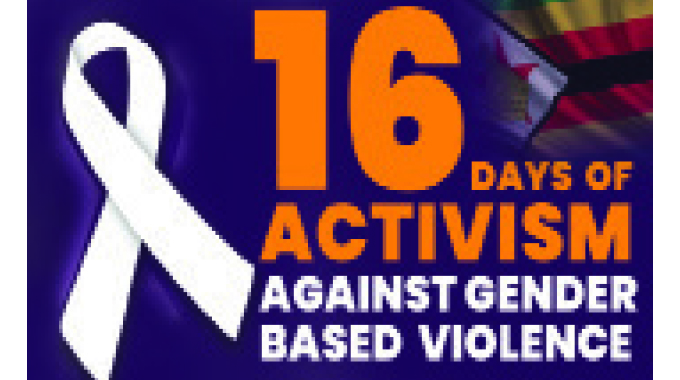‘Abusive relationships do end in death and tears’

Thandeka Moyo-Ndlovu
LESLEY* joins women around the world in commemorating the beginning of 16 Days of Activism against Gender Based Violence (GBV) recalling how an abusive marriage almost cost her life.
She is part of the one in every three Zimbabwean women aged between 15 and 49 who have experienced violence, and a survivor who was saved by her six-year-old son.
On that almost fateful day, she was battered inside a room in Pumula while neighbours who had grown to fear her estranged husband watched but could not help her.
He punched her all over the body and her wails were all he needed to move on to an electric cable before locking their door.
This was all done in front of their son who, according to Lesley, was now accustomed to the daily beating she received whenever she attempted to go outside the gate.
The man eventually managed to have the same cable round her neck and was going to choke her if her son did not open the door after hitting his abusive dad with a pan.

“I am glad to have lived to witness yet another commemoration of the 16 days because unlike what people think, these abusive relationships do end in death and tears. This year is more sentimental to me because it’s the first time in three years I have managed to speak out freely.
“I hope many women who are suffering silently will one day gather the strength to rise and stand against abusive partners. Our culture has played a role in ensuring that we tolerate abuse but I am happy that we have such days where we can freely talk about abuse,” she said.
She adds that besides increasing figures, services for GBV survivors had been available in many communities unlike in the past when all there was, was a police station.
“As we start our 16 days today, as individuals we may all take time to reflect on how we can play a part in ensuring that no woman is abused because all of us have relatives who are abused or who are abusing women and girls. Yes, we rely on the Government and organisation to advocate and put laws, but it all begins with us making personal decisions to let anyone we know get away with abusing women, our country will be a better place.”
The 16 Days of Activism Against Gender-Based Violence is an international campaign to challenge violence against women and girls.
On Monday, Parliament was lit orange in commemoration of the 16 Days of Activism against GBV.
Each year, the 16 Days start on November 25 – the International Day for the Elimination of Violence against Women – and run to 10 December, Human Rights Day.
The global theme for this year’s 16 Days of Activism against GBV is: “Orange the world: End violence against women now!”
In an interview, the Women’s Coalition of Zimbabwe chairperson Ms Evernice Munando said the start of these 16 days is a reminder to everyone to take action against GBV.
“This day is a reminder to all of us, we need a collective action and be our sister’s keeper so that we protect each other. We should be on the lookout for those who are being bullied in communities and help them face abuse and also seek help before they lose their lives,” she said.
“This is also a day when we take time to celebrate those who have survived abusive relationships and are standing to prove to others that there is life after all that. We are also remembering our women and girls who have died in the hands of loved ones and say it is the duty of everyone to ensure we end GBV.”
Although GBV is known to be pervasive in all settings, Covid-19 disrupted existing protective structures and created multiple circumstances that led to various forms of violence, abuse, and exploitation.
In spite of increased global awareness of the need to address GBV amid the Covid-19 pandemic, its prevalence was difficult to determine, in light of a large number of cases that went unreported, as well as the limited resources that were in place for gathering this type of evidence in emergency contexts.
Experiencing GBV during the Covid-19 has been associated with a host of negative health, psychosocial, and developmental outcomes in the lives of survivors — both in the short-term as well as the long-term.
The United Nations has described the impact of Covid-19 on violence against women and girls as “the shadow pandemic” following a global increase in domestic violence. Without sufficient attention to preventing and responding to GBV, in Covid-19 response and recovery measures, women’s and girls’ rights across the world were threatened.
In Zimbabwe, GBV service providers recorded an increase in reported GBV cases compared to trends prior to the pandemic.
In a statement, SADC executive secretary Mr Elias Mpedi Magosi bemoaned the lack of consistent and sustained GBV prevention programmes and lack of reliable, timely and accessible data on GBV to inform targeted GBV programmes in the Region.
“This year’s theme for the campaign, Orange the World: End violence against women now! calls for immediate action to end violence against women and girls. In line with the theme, I welcome the campaign by the United Nations Secretary-General, titled UNiTE by 2030 to End Violence against Women, calling for global action to prevent and eliminate violence against women and girls,” said Mr Magosi.
“Efforts to prevent and eliminate violence against women and girls have been, and continue to be pivotal to the SADC regional integration and development agenda by addressing gender-based violence.
This year’s theme complements SADC’s on-going efforts and commitment expressed in the SADC Protocol on Gender and Development that calls for the development of strategies to prevent and eliminate all harmful social and cultural practices.”
He also called for coordinated efforts involving all stakeholders including government, civil society organisations, traditional leaders, researchers, development partners, the media and the private sector to deal with gender-based violence.
“It is such a coherent, multi-disciplinary, multi-level and a multi-sectoral approach that will yield greater impact, sustainable prevention of GBV, and bring about transformational change that we all aspire for,” he said.
“Let us work together to create a GBV free and safe SADC region, remembering that any progress in a society is measured by how its women and girls are treated.
There cannot be any meaningful social progress and development if GBV is allowed to thrive in our society.”–@thamamoe











Comments